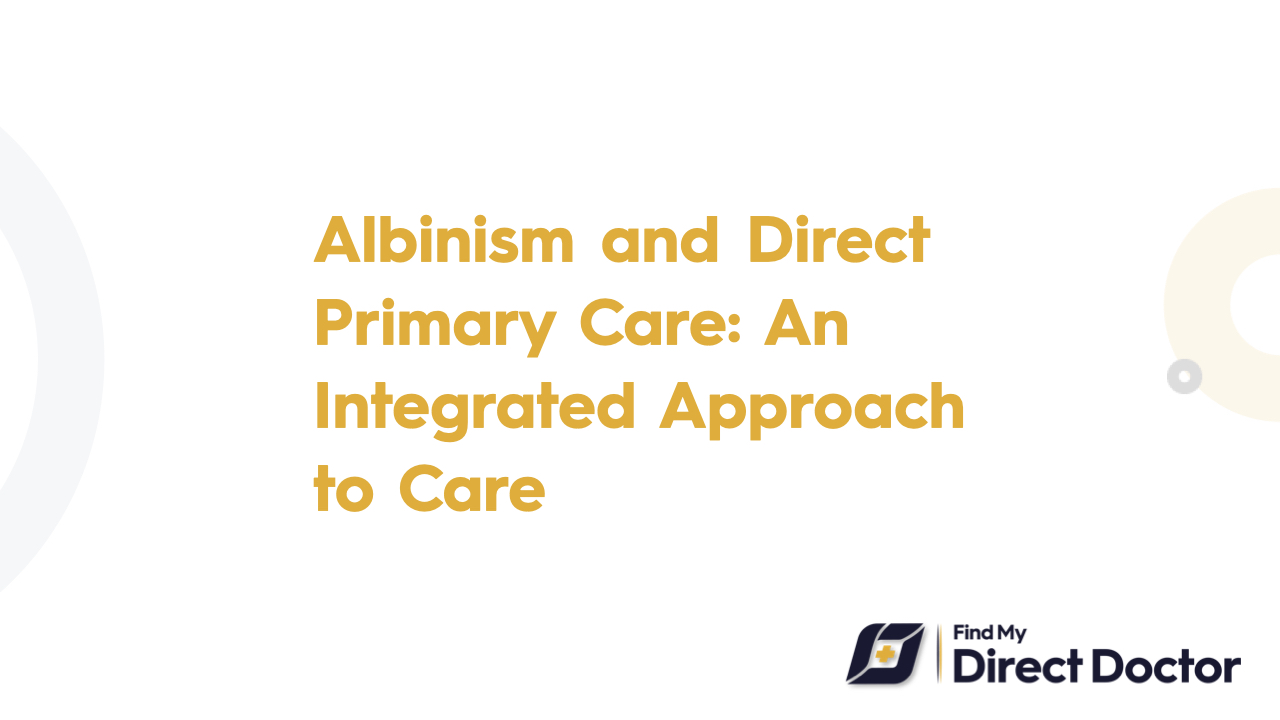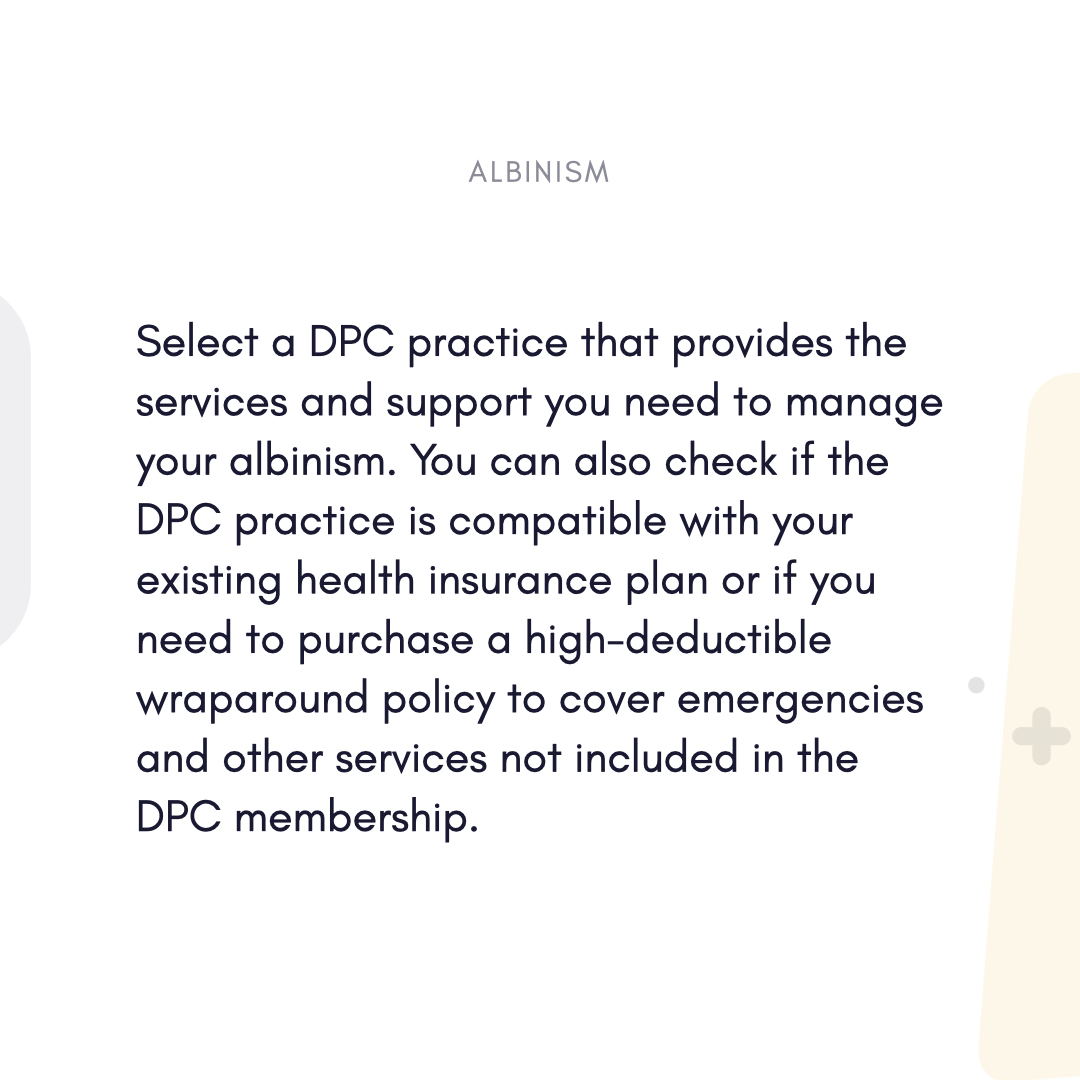Albinism and Direct Primary Care (DPC): Lifelong Support for Skin, Vision, and Well-Being
Albinism, a hereditary disorder causing low melanin production, affects skin, hair, and eye health and calls for lifetime management to avoid consequences including skin cancer and vision impairment. Combining preventive strategies, specialist coordination, and education to empower individuals and families, Direct Primary Care (DPC) provides a customized, patient-centered approach to albinism care. DPC changes the management of albinism as follows.

Knowledge of Albinism: Important Difficulties
- Lack of melanin: High risk of sunburn, skin damage, and melanoma.
- Vision challenges:
- Nystagmus (involuntary eye movements), photophobia (light sensitivity).
- Strabismus (crossed eyes), refractive errors.
- Psychosocial impact: Depression, anxiety, or social stigma linked to visible differences.
How DPC Improves Albinism Treatment
Under the DPC membership model (USD 50–150/month), patients gain unlimited access to a primary care physician. For those with albinism, this means:
- No rushed visits: Time to address skin, vision, and emotional health holistically.
- Transparent pricing: Discounted specialist referrals, tests, and preventive care.
- Coordinated care: Seamless collaboration among ophthalmologists, dermatologists, and mental health experts.
-
Preventive Skincare and Cancer Surveillance
Following Skin Cancer Foundation guidelines:
- Full-body skin exams every 3–6 months for early melanoma/precancerous detection.
- Advice on UV-protective clothing and high-SPF sunscreens (USD 10–20/month).
- Affordable biopsies for suspicious moles at cash-pay rates (USD 100–200).
-
Vision Enhancement
- Annual eye exams: Coordinate low-vision aids, tinted glasses, or corrective lenses.
- Manage photophobia with specialized eyewear.
- Early referrals for children with vision-related motor/social delays.
-
Education and Holistic Health
- Mental health referrals: Address anxiety/depression tied to stigma.
- Sun safety programs: UV index tracking, sunscreen reapplication, protective clothing.
- Genetic counseling: Discuss inheritance risks for family planning.
DPC’s Benefits for Albinism Patients
- Individualized Preventive Care:
- Custom sun protection and skin monitoring plans.
- Vision care plans with strabismus/refractive error referrals.
- Economical Access:
- Dermatology visits at USD 75–150 (vs. USD 300+).
- Affordable visual field tests or mole mapping.
- Ongoing Advocacy:
- School/workplace accommodations (large-print materials, shaded areas).
- Family education for supportive home environments.
Customized Albinism Management in DPC
The National Organization for Albinism and Hypopigmentation (NOAH) emphasizes multidisciplinary care. DPC delivers:
- For Children:
- School advocacy: IEP/504 plans for vision accommodations (e.g., front-row seating).
- Developmental referrals: Occupational therapy for motor delays.
- For Adults:
- Workplace adjustments: Flexible lighting, screen-reading software.
- Skin cancer prevention: Mole-tracking tools, self-exam training.
- For All Ages:
- Vitamin D monitoring: Supplements for sun-avoidance deficiencies.
- Community connections: Albinism peer support groups.
Real-Life Success Stories
- Case 1: Sophia, 12, avoided severe sunburn with DPC-recommended UV-blocking swimwear and family sunscreen training.
- Case 2: Carlos, 40, caught early-stage melanoma via DPC-coordinated skin checks, avoiding costly late-stage treatment.
FAQs: Albinism and DPC
- Q: Can DPC recommend specific sunscreen?
- A: Yes! Providers suggest discounted high-SPF, broad-spectrum options.
- Q: Are low-vision aids covered?
- A: DPC negotiates cash-pay discounts with optical stores (devices not covered).
- Q: Cost of genetic testing?
- A: Carrier testing for albinism genes: USD 200–500 via DPC-affiliated labs.
Why DPC Is Crucial for Albinism Care
Albinism requires lifelong, meticulous management. DPC improves outcomes by:
- Preventing complications: Early skin cancer detection and vision preservation.
- Lowering costs: Transparent pricing for screenings, referrals, and sun protection.
- Building trust: Doctors who address physical, emotional, and social impacts.
How DPC Specifically Helps Albinism Patients
DPC aligns with NOAH standards by offering:
- Regular monitoring: Frequent skin/eye exams for early issue detection.
- Education-first approach: Ongoing coaching on sun safety and self-advocacy.
- Barrier-free access: No insurance hurdles or long waits for critical appointments.
Take Control of Your Health with DPC
Living with albinism doesn’t mean fragmented care. With DPC, gain a partner committed to safeguarding your skin, vision, and overall health through affordable, personalized plans.






